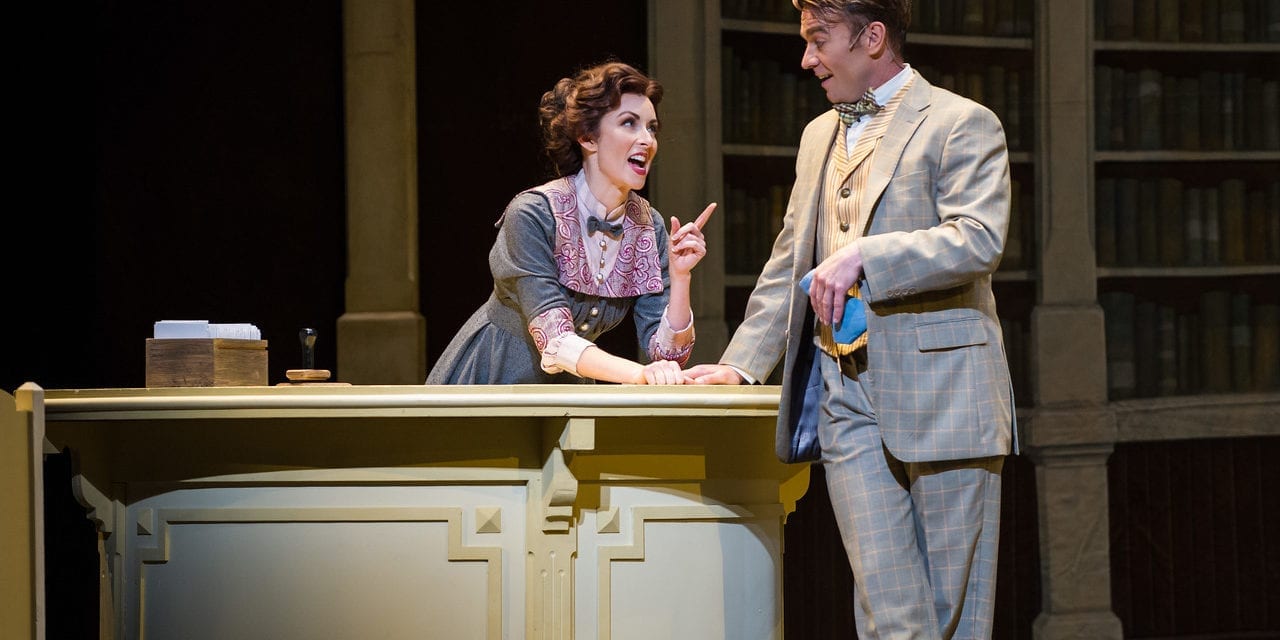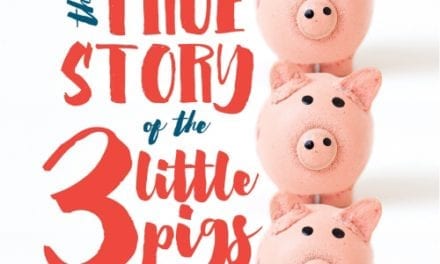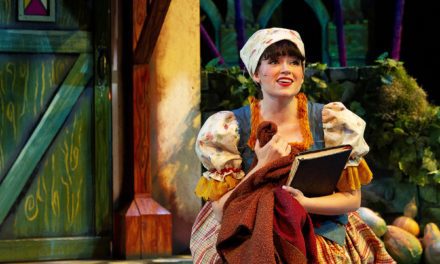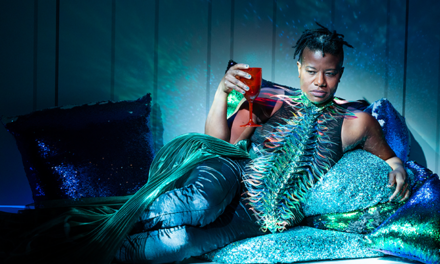LOGAN — One of the most golden examples of a golden age musical would have to be Meredith Willson’s The Music Man. The story of a fly-by-night salesman who swings into River City, Iowa, to sell the town on a boys’ band they didn’t know they needed is familiar to almost everyone in the audience at Utah Festival Opera & Musical Theatre. With its beloved, familiar score, The Music Man is always a safe choice for family friendly entertainment and especially summer festival theatre. The production staff of the Utah Festival Opera and Musical Theatre Company does a solid job bringing this classic to their stage.

Show closes August 9, 2017.
Director and choreographer Valerie Rachelle doesn’t stray far from convention in this production, which works well most of the time for this company of performers. While the staging of the group numbers is fairly traditional, the choreography she created is a lovely breath of fresh air which infuses the dances with a great energy and charm. “Seventy-Six Trombones” and “Marian the Librarian” were memorable dance numbers, taking old well-acquainted songs and giving them an update. Kudos to the strong young adult dancers who carried the bulk of that burden. “Shipoopi” was also delightful, and Tommy Djilas (played by Bryce Wagner) and Zaneeta Shinn (played by Mia Mekjian) were superb among an already strong dance corps. Additionally, the production’s Ethel Toffelmeier (Katelin Ruzzamenti, also the assistant choreographer) could really dance! It was refreshing to see Ethel really step up, instead of only being used as a foil for Marcellus Washburn (played by W. Lee Daily) and everyone dancing around them.

Photo by Waldron Creative.
Curt Olds did a wonderful job in making this role his own, while still recognizable to traditionalists. Olds has a fantastic voice and the vocal agility to conquer the patter songs and the humor, while delivering on the love song in Act Two. He played the role with a touch of a smarmy and slick out-of-towner, while remaining charming and seemingly sincere when needed. The “Sadder But Wiser Girl” with Marcellus was especially fun, as he outlines his plans for some ‘canoodling’ while remaining carefree and unattached. And yet, I really believed that he loved Marian and was really torn by the end of the chase scene, when he could have escaped, but chooses to stay. He was delightful through and through.
Vanessa Ballam is a beautiful Marian Paroo, the old-maid librarian/music teacher brushed with a hint of scandal in a small town. Ballam plays a nice arc, as her character grows from uptight spinster to a woman who might be willing to risk heartbreak. Her voice is very mature, and at times quite heavy, which is surprising in such a small person. She handles the vocal demands of the part easily, although most of the songs are sung without much dynamic variation. This is most apparent in “My White Knight,” which is my least favorite song of the show, as it seems dated and boring. On the other hand, “Till There Was You” was lovely, “Sweet and Low” was charming, especially in counterpoint to the outstanding men of the School Board (played by Markel Reed, Scott Ballantine, Brian Skoog, and Michael Colman) who sing in tight, beautiful harmony, never missing a beat or intricate chord. I could have listened to them all night.

Photo by Waldron Creative.
Other performances worthy of mention are Cabiria Jacobsen as Mrs. Paroo and Julie Hollist Terrill as Mrs. Shinn. They were both so fun to watch and brought great energy and charm to their parts. I would like to see them both in other, larger roles.
The live pit orchestra is a nice touch in a time when many theatre companies have come to rely upon minus tracks more and more. Conductor Karen Keltner kept the tempos bright and lively, and her pit was well-rehearsed. Some of the intricate flute and piccolo runs were a touch iffy, but the brass section was confident and strong, and the entire orchestra supported the singers very well. The ensemble singers were strong and full-bodied and sounded lovely from top to bottom, thanks to chorus master Stephen L Carey One minor fussy note: the “Pick-a-Little” numbers were a tad too fast, and the Pick-a-Little ladies could hardly keep up and get the words out clearly. I know every word to every song in this show, and I could not understand what was being said in either number that they sang. \

Photo by Waldron Creative.
The set design by Bill Forrester was a bit uneven, with many great aspects as well as a couple less than stellar elements. The scenery (originally designed and built for The Village Theatre in Everett, Washington) was beautiful, with lovely painted drops and nice details, with the exception of the Paroo’s parlor and the footbridge, which both felt like afterthoughts. The parlor furniture was unanchored by a wall or drop and seemed to be a group of chairs and a piano floating in space, with a door that was used alternately as the front door to the home, as well as an exit to another part of the house. The footbridge seemed too small for the stage space, and the blocking sent actors both wading through the creek over which it spanned and daintily stepping over it so as not to get their feet wet. But these are minor details in an otherwise lovely setting. All the other scenes were well appointed and picturesque, which perhaps made the contrast with these two scenes more apparent.
The costumes by Lydia Semler were also a mixed bag. Many costumes (like those for Marian, Mrs. Shinn, and the Pick-a-Little Ladies) were lovely, fresh and perfect for 1910, while some of the others were a little less cohesive. The ensemble suffers the most in the costume department, with a mishmash of costume pieces. The traveling salesmen in the opening scene were also mismatched, garish and ill-fitting, although I liked the concept of the various plaids and “city-slicker” feel to the scene. Semler did an admirable job with the resources she had, I’m guessing, although the ensemble scenes tended to feel a little bit like a community theatre (“bring-what-you-have-in-your-closet-at-home”), which UFO&MT is clearly not.
The Music Man, as presented by Utah Festival Opera this summer, is a solid, well-staged, lovely example of an old gem that’s been polished and shined and served up proudly to an audience who knows exactly what it’s getting and can count on a stalwart, faithful show.





